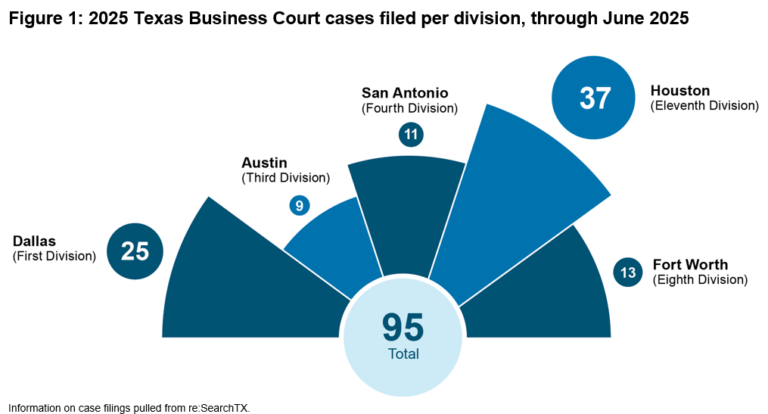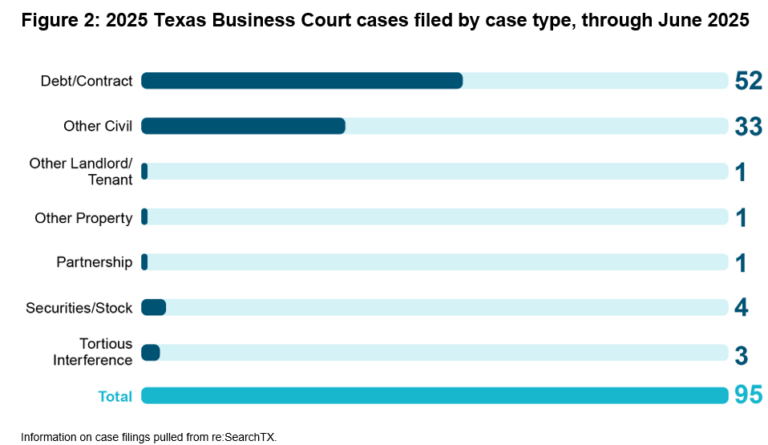The first half of 2025 has brought quite a few updates to the Texas Business Court, including several changes due to recent legislation and nearly 100 new case filings.
The Texas Business Court was formed in September 2024 as a specialized court that aims to provide a more efficient and predictable environment for resolving high-stakes business disputes.
House Bill 40
The biggest updates to the Business Court resulted from House Bill 40, which was passed by the state legislature on June 2, 2025, and signed by Governor Greg Abbott on June 21, 2025.
House Bill 40 takes effect in September 2025 and introduces clarifications and expansions to the jurisdiction of the Texas Business Court. One such change lowers the threshold for the amount in controversy of certain actions to fall within the Court’s jurisdiction, from $10 million to $5 million. This change also allows related transactions to qualify towards an aggregate value.
Another change introduced by the bill allows for cases filed before September 1, 2024 to be transferred to the Business Court. The majority of opinions issued by the Court prior to this change related to the removal of actions that were filed prior to this date.
At the time of the Business Court’s initial creation, six divisions (the Second, Fifth, Sixth, Seventh, Ninth, and Tenth Divisions) were designated for abolishment in 2026, absent the appropriation of funds during the legislative session. Among other changes, House Bill 40 repeals this abolishment provision, preserving these divisions for potential future funding decisions by subsequent legislatures.
House Bill 40 and Intellectual Property Disputes
Importantly, one of the changes from House Bill 40 is connected to intellectual property, and specifically trade secrets. With the passing of House Bill 40, the jurisdiction of the Texas Business Court has expanded and is now a venue available for trade secret misappropriation. Given that intellectual property and intangible assets comprise the majority of the value of most companies, today, this means that larger dollar-value cases are likely to be in this venue.
More specifically, House Bill 40 references the Texas Uniform Trade Secrets Act (TUTSA), which allows for the following remedies for trade secret misappropriation: (i) injunctive relief; (ii) damages; and (iii) attorneys’ fees. Damages measures and remedies may include lost profits, a reasonable royalty, or unjust enrichment.
The passing of House Bill 40 also allows the Texas Business Court to hear disputes over the ownership and licensing of intellectual property.
2025 Case Filings to Date
As of June 30, 2025, a total of 95 cases have been filed this year, across all five divisions (see figure 1).
As illustrated in the chart above, the Eleventh Division in Houston continues to be the busiest, with 37 new cases filed through June 2025. The First Division in Dallas followed with 25 cases filed. While the remaining divisions continued to see comparatively fewer cases, there has been an uptick in 2025, particularly in the Eighth Division in Fort Worth. Austin, while the lowest on this chart today, may see more cases due to its heavy tech industry connections.
During the first half of 2025, the Business Court also continued to see a variety of case types filed within each division (see figure 2).
Consistent with 2024, most cases were filed under the “Debt/Contract” and “Other Civil” codes in the first half of 2025, with these case types representing 85 of the 95 cases filed, or nearly 90%.







